#dhul qarnayn
Explore tagged Tumblr posts
Text

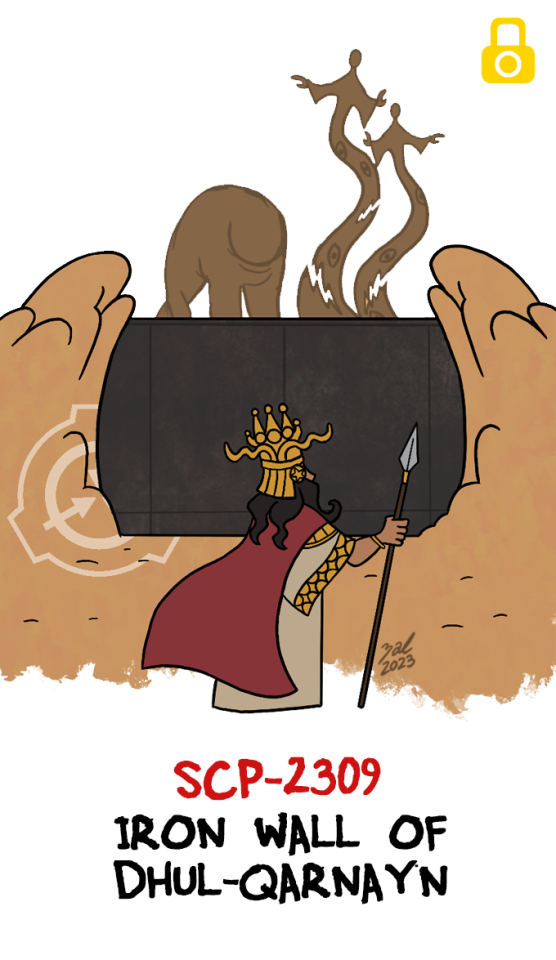
SCP-860 and SCP-2309
#scp foundation#scp#fanart#fan art#scp art#key#dhul qarnayn#mythology#monster#wall#sarkicism#cotbg#scp cards#gog and magog#forest
140 notes
·
View notes
Text

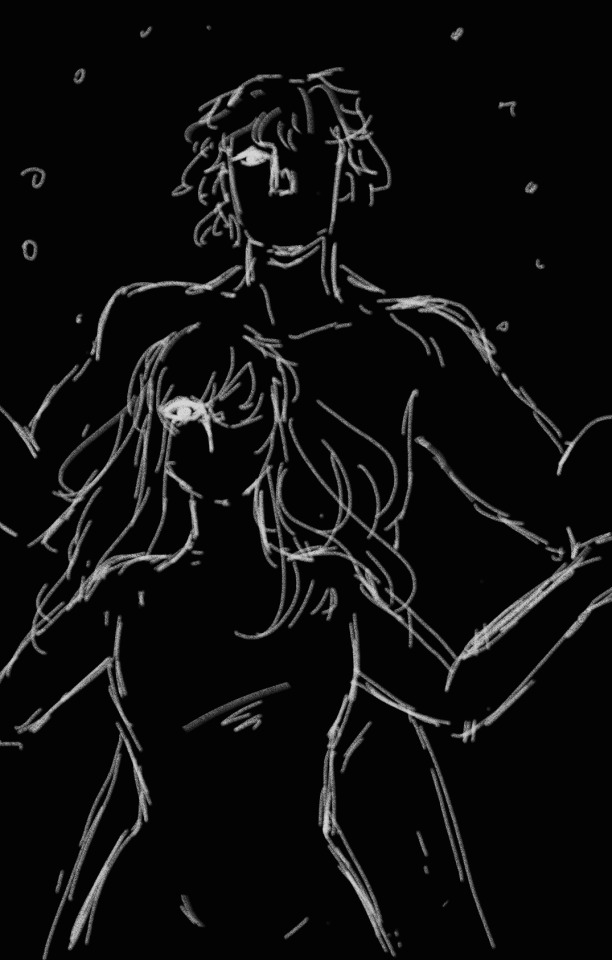
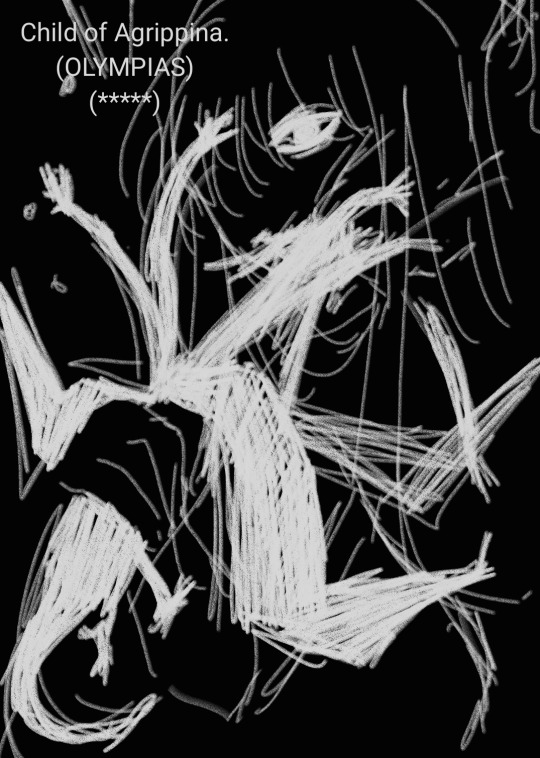

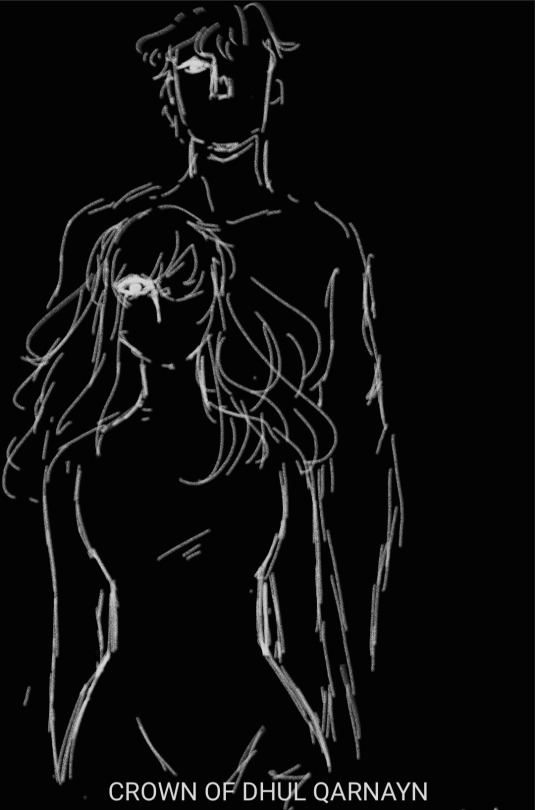
OLYMPIAS COMPLEX
#mastersona#rosesona#beast of narcissism#beastrose#iskandar (fate)#dhul qarnayn#draco (fate) but in a super minor role due to sadism#No I will not be explaining. actually i will later but in a funny comic form
8 notes
·
View notes
Note
From the Asian perspective, would it be fair to say Alexander isn't as remembered there in comparison to the Western world because, to them, he was "just one of the many" of their conquerors?
(Somehow, I mixed up this answer to a different question; I'm surprised nobody commented, "What does your answer have to do with Leochares! LOL)
This is an interesting question in that the basic assumptions are faulty.
First, thanks to the Alexander Romance, Alexander would vie with Genghis Khan as possibly the most famous non-religious historical figure worldwide. That is not an exaggeration. There are legends of Alexander all over, some in places you’d never expect, such as among the Mali in sub-Saharan Africa, and the Malays in Southeast Asia.

(Alexander Questions the Philosopher, the Physician, and the Goblet, from the Kamseh of Nizami, Muhgal, India)
In a former answer to an Ask, I said that I thought Alexander would at once be annoyed that Julius Caesar was more famous/recognized in the Anglophone West (thanks in large part to Shakespeare), but assuaged by the fact he beat Caesar all to hell in the wider world. He seeped into all sorts of legends, not always by the name we’d recognize. The Persian Iskander is probably his most famous alternate, but in the Malay legends noted above, he’s Dhul-Qarnayn, from the Muslim Dhu Al-Qarnayn, the Two-Horned One. And he was the inspiration for other heroes, such as King Arthur.
He's EVERYwhere. Ha.

(Alexander at the Wall of Gog and Magog, from the Shahnameh of the Persian poet Ferdowsi)
Richard Stoneman (the world’s leading expert on the Alexander Romance) has edited a recent (2022) book on this topic: A History of Alexander the Great in World Culture, Cambridge U. Press.
The other problem with the question, which the asker may not realize, is a seeming assumption that in contrast to the west, Asia was constantly being invaded and conquered. That also is wrong. There have been many, many conquerors in the West, too. How about Rome? She conquered all her neighbors, west and east, many of whom saw her as an unwelcome outsider and fought back, such as Vercingetorix or Boudica. Similarly in Asia, with the Chinese and their neighbors, or the Turks in Persia. Most Asian conquerors have been…Asian. Most European conquerors have been…European. Most African conquerors have been…African (Musa I of Mali, Queen Amina of Nigeria, or Shaka Zulu, for instance). 😊
What’s really afoot here is a deeply embedded leftover of Roman anti-Asian bias. “Asians” are weak and easily conquered compared to Westerners/Romans, who are strong and love their freedom. That passed into European thought during the Renaissance, fueling a lot of Colonialist ideas and behavior. We (the West) must save the poor benighted souls in the East, both religiously (Christianize them from Islam or their “native” [inferior] beliefs) and culturally (make them dress, talk, and think like Europeans).
This same attitude in reverse was part of first Abbasid, and later Ottoman thinking. 😊 To be fair, when the Abbasids were looking West, Europe was in a pretty sad state. But the much earlier Achaemenid Persians also found the Greeks uncivilized. The Other is frequently seen so by those who use their own measuring stick of what-is-civilization. And one of the ways the Other is “othered” involves portraying them as weak, chaotic, and ripe for conquest and/or frequently conquered in the past—as opposed to “us,” who are strong and the conquerors.
Again, this point of view is so deeply embedded that we may express it without realizing it or even believing it ourselves when pressed. Yet the narrative of the West as “free” versus the East (Asia) as “slavish” is also quite popular with the alt-right crowd—so I try to call it out when it rears its head, however innocently. And I do assume the asker meant it innocently, as most often when someone does make those assumptions, it’s because they heard it somewhere else and don’t have the historical context to recognize the inherent bias.
So I point out that bias.
#asks#Alexander the Great#Alexander Romance#Alexander the Great in World Literature#Shahmaneh#Kamseh#Alexander the Great in world legend#anti-Asian bias#popularity of Alexander the Great worldwide#ancient Greece
31 notes
·
View notes
Text
Tafsir Ibn Kathir: Surah Al-Kahf Ayah 89-91
In the Name of Allah, the Most Gracious, the Most Merciful.
18:89 Then he followed (another) way,
18:90 Until, when he came to the rising place of the sun, he found it rising on a people for whom We (Allah) had provided no shelter against the sun.
And We knew all about him (Dhul-Qarnayn).
18:91 So (it was)!
His Journey East
Allah tells;
Then he followed (another) way, Until, when he came to the rising place of the sun,
Allah tells us that Dhul-Qarnayn then traveled from the west of the earth towards the east. Every time he passed a nation, he subjugated the people and called them to Allah. If they obeyed him, all well and good, otherwise he would humiliate them and take their wealth and possessions. From every nation he took what his armies needed to fight the next nation. When he reached the place where the sun rises, as Allah says,
he found it rising on a people, meaning a nation,
for whom We (Allah) had provided no shelter against the sun.
meaning, they had no buildings or trees to cover them and shade them from the heat of the sun.
Qatadah said,
"It was mentioned to us that they were in a land where nothing grew, so when the sun rose they would go into tunnels until it had passed its zenith, then they would come out to go about their daily lives and earn themselves a living.''
So (it was)!
And We knew all about him. Mujahid and As-Suddi said,
"This means that Allah knew everything about him and his army, and nothing was hidden from Him, even though they came from so many different nations and lands. For,
Truly, nothing is hidden from Allah, in the earth or in the heaven. (3:5)''
7 notes
·
View notes
Text
Yesterday during class I was reading the Greek Alexander Romance and read a passage where he traps the tribes of Goth and Magoth behind 2 mountains (borrowed from the Quranic tale of Dhul Qarnayn trapping Yajuj and Majuj behind a wall) but it got me thinking as a thought experiment about a God less naturalistic explanation for reality which although overall does not make sense and removes the foundational basis of reality, is still an interesting theory to think on.
Although I brushed the thought away, later in the day I had a personal living experience with The Reality that is God and it made me think upon the profound impact of personal experience that most believers do experience.
However where a thousand arguments could not convince Dawkins, a slew of miracles could not sway Pharaoh, yet millions believe without either. Which makes me think belief is a gift that God scatters among souls and one should be thankful to be a believer. Sounding very calvinist in this realisation but it does seem to be what it comes down to, neither personal experience nor rational argument but Divine Grace.
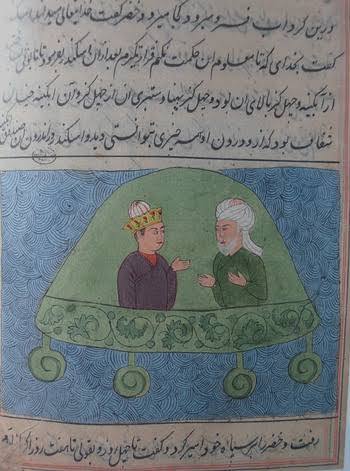
#islamic#islam#god#christianity#christian faith#philosophy#muslim#muslimblr#ancient egypt#alexander the great#ancient greece#quran
7 notes
·
View notes
Text
18:92- 98
ثُمَّ أَتْبَعَ سَبَبًا ٩٢
Then he followed a way.
حَتَّىٰٓ إِذَا بَلَغَ بَيْنَ ٱلسَّدَّيْنِ وَجَدَ مِن دُونِهِمَا قَوْمًۭا لَّا يَكَادُونَ يَفْقَهُونَ قَوْلًۭا ٩٣
Until, when he reached [a pass] between two mountains, he found beside them a people who could hardly understand [his] speech.
قَالُوا۟ يَـٰذَا ٱلْقَرْنَيْنِ إِنَّ يَأْجُوجَ وَمَأْجُوجَ مُفْسِدُونَ فِى ٱلْأَرْضِ فَهَلْ نَجْعَلُ لَكَ خَرْجًا عَلَىٰٓ أَن تَجْعَلَ بَيْنَنَا وَبَيْنَهُمْ سَدًّۭا ٩٤
They said, "O Dhul-Qarnayn, indeed Gog and Magog are [great] corrupters in the land. So may we assign for you an expenditure that you might make between us and them a barrier?"
قَالَ مَا مَكَّنِّى فِيهِ رَبِّى خَيْرٌۭ فَأَعِينُونِى بِقُوَّةٍ أَجْعَلْ بَيْنَكُمْ وَبَيْنَهُمْ رَدْمًا ٩٥
He said, "That in which my Lord has established me is better [than what you offer], but assist me with strength [i.e., manpower]; I will make between you and them a dam.
ءَاتُونِى زُبَرَ ٱلْحَدِيدِ ۖ حَتَّىٰٓ إِذَا سَا��َىٰ بَيْنَ ٱلصَّدَفَيْنِ قَالَ ٱنفُخُوا۟ ۖ حَتَّىٰٓ إِذَا جَعَلَهُۥ نَارًۭا قَالَ ءَاتُونِىٓ أُفْرِغْ عَلَيْهِ قِطْرًۭا ٩٦
Bring me bars of iron" - until, when he had leveled [them] between the two mountain walls, he said, "Blow [with bellows]," until when he had made it [like] fire, he said, "Bring me, that I may pour over it molten copper."
فَمَا ٱسْطَـٰعُوٓا۟ أَن يَظْهَرُوهُ وَمَا ٱسْتَطَـٰعُوا۟ لَهُۥ نَقْبًۭا ٩٧
So they [i.e., Gog and Magog] were unable to pass over it, nor were they able [to effect] in it any penetration.
قَالَ هَـٰذَا رَحْمَةٌۭ مِّن رَّبِّى ۖ فَإِذَا جَآءَ وَعْدُ رَبِّى جَعَلَهُۥ دَكَّآءَ ۖ وَكَانَ وَعْدُ رَبِّى حَقًّۭا ٩٨
[Dhul-Qarnayn] said, "This is a mercy from my Lord; but when the promise of my Lord comes [i.e., approaches], He will make it level, and ever is the promise of my Lord true."
#quranverses#islam#share islam#muslim#convert to islam#islamquotes#hadith sahih#quran#islamic reminders#hadith#revert islam
34 notes
·
View notes
Text

Qur'anic Chapter Khaf And Friday
"Whoever reads Soorat al-Kahf on Friday, Allah will bestow upon him light between those two Fridays. (al-Bayhaqi)
In another narration, the Prophet said, “Whoever reads Surat al-Kahf as it was revealed, there will be a light for him on the Day of Resurrection.(al-Sunan al-Kubra)
Surat Al-Kahf was revealed in Makkah. Many Ahadeeth confirm the virtues of this Surah. As we are recommended to read Surah khaf on Friday. It is said that it will protect and save us from the fitnah of dajjal (anti Christ), trials and afflictions. The first and the last ten Ayahs provide protection from Dajjal. It is pivotal to understand that Surat Al-Kahf is not just a magical spell that will serve as a shield against the Antichrist. Rather, the comprehension of its underlying meaning and application of the suggested measures will save us from Dajjal.
Prophet Muhammad pbuh stated: “Whoever memorizes ten Ayahs from the beginning of Surat Al-Kahf will be protected from the Dajjal.” (Muslim, Abu Dawood, An-Nasai and At-Tirmidhi)
This Surah was revealed in answer to the questions which was posed by the pagans of Mecca to test prophet pbuh. As Makkan phase can be divided into four stages, that was the third period. It was the era of religious persecution of believers. Many times to the point of being ill- treated and oppressed due to their faith. Allah, however, not only gave them a complete answer to their questions but also drew their attention by those stories to take heed from it. There was a conflict going on at that time in Makkah between believers and disbelievers. As muslims were least in number. That's why they were intentionally practising patience in such distressing situations to achieve their goal. They very well knew that if they retaliate, they would be easily overpowered. So couldn't risk their lives, because they were the carriers of Islam—they had to take the religion forward.
In Surah khaf, there are four stories which we get the insught from these stories to face the trials and afflictions.
1. Trial of Faith – Young People of the Cave/ Ashabu Al-Kahf (Verses 9 – 26)
2. Trial of Wealth – The story of the Rich and the Poor (Verses 32 – 44)
3. Trial of Knowledge – Moses and Al-Khidr (Verses 60–82)
4. Trial of Power –Dhul-Qar-nayn with Yajuj Majuj (Verses 83–98)
Let's explore each along with lessons we get from each story.
1."The people of the cave" : It’s the story of young men who lived in a disbelieving town, so they decided to migrate to save their imaan and took refuge in the cave. Allah mentions the word “fityah” (plural of fata)- young boys to draw the attention that they were young people who had firm faith in Allah. But they did not follow the people blindly but thought rationally. In every society and culture there are trenda and precedents presents and people tend to follow them unknowingly. And people don't dare to follow against them. So here thses young men though powerless and weak still troed to preserved their faith.
▪︎ Lesson of this story is the 'Trial of Faith'
2. "The owner of two gardens" : A story of a man whom Allah blessed with two beautiful gardens, but the man forgot to thank the One who blessed him with everything and he even dared to doubt Allah regarding the afterlife. So his garden was destroyed – he regretted it, but was too late and his regret did not benefit him.
▪︎ Lesson of this story: 'Trial of wealth'
3. "Musa pbuh and Khidr pbuh" : When Musa pbuh was asked “Who is the most knowledgeable of the people of Earth?” Musa pbuh said that it was him as he assumed he was the only prophet on Earth at the time. But Allah revealed to him that there’s someone who knows more than him about certain things. Musa pbuh traveled looking for him and learned how divine wisdom can sometimes be hidden in matters which we perceive as bad.
▪︎ And Lesson of this story: 'Trial of knowledge'
And now to the FINAL one, "Global Phenomena"
4. "Dhul-Qarnayne" : Allah mentions the story of a great king who was given knowledge and power travelling the world helping people and spreading all that’s good. He was able to overcome the problem of Gog and Magog (Yajooj-Majooj) by building a massive dam with the help of people whom he could not even understand.
▪︎ Lesson of this story: 'Trial of power'
Allah says to us four/4 kind of stories relating 4 kind of trials that we face daily in our day to day lives.
But, What is the relation between 'Surah Kahf' and 'Dajjal' ?
Dajjal will appear before the day of judgement with 4 trials:
A▪︎He will ask people to worship him and not Allah: "Trial of faith"
B▪︎He will be given powers to start/stop rain and tempt people with his wealth: "Trial of wealth"
C▪︎He will tempt people with "knowledge” and news he gives them: "Trial of knowledge"
D▪︎He will control huge parts of the Earth: "Trial of power"
Those people who sticks strong to Allah in every single aspect of their life, those people who don't fall for the illusion, delusion, corruption and brainwashing of this world. The Dajjal has already set his foot, and entered through the midern and cultural engineering of the 20th century. It's almost ready to take its throne. People are infested in this world from many direction.
Moreover Almighty Allah has given the SOLUTION for these Trials and Test.
1.Good companionship to build a strong Faith : To protect our faith we need to be surrounded with good people. Besides this, the believers have been taught that even if they are persecuted by a cruel society, he should not bow down before falsehood but emigrate from the place all alone, if situations demand, with trust in God. Do not blindly follow trends or customs of the society.
2. To adopt Humility as we own nothing in this world. Pride and Arrogance will come back to bite. What we need to remember is that everything we have is a mercy and a gift from Allah. We may put in hard work, but if Allah doesn’t put blessing in anything, nothing succeeds. This is why we should be thankful for what Allah has given us. In fact the Surah itself begins by saying “Alhamdulillah”.
3. Be humble and sincere in learning, Knowing the truth of this world. You should have full faith in the wisdom of what is happening in the Divine Factory in accordance with the will of Allah. The Qadar of Allah works in ways that we do not understand. When Allah takes something away from us, we should trust inHis Divine Wisdom. As it was not clear to a Prophet, allow alone people like us. However, Allah clearly wants good for us, and it is important that we trust the One who has given us everything. Allah is sole Caretaker (الرقیب/Ar-Rakib).
4. In the story of Dhul-Qarnayne,
When the people asked Dhul-Qarnayn to help them, he did not just go and help them. Rather he taught them in building and helped them himself as well. We should benefit people. Regardless of the fact that he was being victorious and constantly winning new ground for his empire, he never forgot Allah, Kept going with good deeds. That is something we should remember. In our endeavor to earn sustenance, we should never forget Allah. During our successes, we should remember Allah.
May Allah guide us and protect us from this fitnah. Ameen
#islam#quran#islamic#muslim#islamicquotes#pakistan#islamic group#muslim community#muslim countries#surah al kahf#quran rules#istanbul#islamicpost#islamicreminder#hadith#allah#muslim ummah#makkah#jannah#muslimah#alhamdulillah
13 notes
·
View notes
Text
Ever wondered why Prophet Muhammad ﷺ asked us to recite Surah Al-Kahf every Friday?
This surah has four stories in it, let’s explore what lessons can be learned from them:
1.The people of the cave
It’s the story of young men who lived in a disbelieving town, so they decided to migrate for the sake of Allah and run away. Allah rewards them with mercy in the cave and protection from the sun – they woke up and found the entire village believers.
Lesson: Trial of faith
2.The owner of two gardens
A story of a man whom Allah blessed with two beautiful gardens, but the man forgot to thank the one who blessed him with everything and he even dared to doubt Allah regarding the afterlife. So his garden was destroyed – he regretted, but was too late & his regret did not benefit him.
Lesson: Trial of wealth
3.Musa (AS) and Khidr (AS)
When Musa (AS) was asked “who’s the most knowledgeable of the people of Earth?” Musa (AS) said that it was him as he assumed he was the only prophet on Earth at the time. But Allah revealed to him that there’s someone who knows more than him about certain things. Musa (AS) traveled looking for him learned how divine wisdom can sometimes be hidden in matters which we perceive as bad.
Lesson: Trial of knowledge
4.Dhul-Qarnayn
Allah mentions the story of a great king who was given knowledge and power travelling the world helping people and spreading all that’s good. He was able to overcome the problem of Yajooj-Majooj by building a massive dam with the help of people whom he could not even understand.
Lesson: Trial of power
In the middle of the surah, Allah mentions Iblees as the one who stirs these trials:
And when We said to the angels, “Prostrate to Adam,” and they prostrated, except for Iblees. He was of the jinn & departed from the command of his Lord. Then will you take him and his descendants as allies other than Me while they are enemies to you? Wretched it is for the wrongdoers as an exchange. 18:150
Abu Darda (RA) narrates that the prophet ﷺ said: He who memorizes the first ten verses of Surah Al Kahf will be protected from the trial of the Dajjal. In another narration, it is the last ten verses of Surah Al-Kahf. (Muslim)
5 notes
·
View notes
Text
Locating the Barrier of Gog and Magog: Tradition, Scripture, and Archaeological Speculation
The Qur’anic and Hadith accounts of Gog and Magog (Ya’juj and Ma’juj) present one of the most compelling mysteries in Islamic eschatology. As foretold in Surah al-Kahf and Surah al-Anbiya, these destructive forces are confined behind a barrier constructed by Dhul-Qarnayn—a righteous and powerful figure mentioned in the Qur’an. However, the exact earthly location of this barrier remains…
0 notes
Video
youtube
Le Coran : Fin des Temps, IA et Géopolitique
Le Coran : Fin des #Temps, IA et #Géopolitique
0:04 Introduction/Salutations
1:12 Partager ensemble la #Parole
3:34 #Pardon et #Repentir : une #étape #spirituelle
8:39 Les #trois degrés du #Tawhid
10:28 Pardon et Repentir effacent et transforment
14:02 Sortir du #passé
15:52 Le #Coran pour comprendre l’#actualité
21:14 #Gog et #Magog, le Coran, et les #évènements actuels
26:09 #Genèse et #Eschatologie : retour à l’#origine
28:38 Gog et Magog , le #raisonnement et la binarité
33:25 La Genèse et le #projet d’#Iblis
36:39 L’enjeu de l’#IA et le défi d’Iblis
45:35 l’#alternative à l’IA
47:34 L’IA fruit de l’#expérience
50:20 Conclusion
Descriptif
Le Pardon et le repentir sont nécessaires pour franchir une étape spirituelle, ils effacent les péchés, le passé, et transforment nos actions.
Le Coran est notre guide, il éclaire notre compréhension des évènements actuels pour nous permettre de comprendre les véritables enjeux et défis auxquels l’#Homme est confronté.
Aujourd’hui est le moment de la réalisation du projet d’iblis à travers l’avènement de l’IA et de Gog et Magog, qui trouve sa source dans la genèse.
La #Révélation nous offre l’alternative et les clefs pour ne pas tomber dans le piège de la séduction d’iblis, et revenir à notre origine et à notre véritable mission.
#Versets
#Sourate 30 « Les abeilles »
70 Allah vous a créés ! Puis Il vous fera mourir. Tel parmi vous sera reconduit jusqu'à l'âge le plus vil, de sorte qu'après avoir su, il arrive à ne plus rien savoir. #Allah est, certes, Omniscient et Omnipotent.
Sourate 11 « Hud »
81 Alors dirent: « Ô Lut (Loth), nous sommes vraiment les émissaires de ton Seigneur. Ils ne pourront jamais t'atteindre. Pars avec ta famille à un moment de la nuit. Et que nul d'entre vous ne se retourne en arrière. Exception faite de ta femme qui sera atteinte par ce qui frappera les autres. Ce qui les menace s'accomplira à l'aube. L'aube n'est-elle pas proche ? »
Sourate 18 « La caverne »
94 « Ils dirent: « Ô Dhul-Qarnayn, les Yaʾjuj (gog) et les Maʾjuj (Magog) commettent du désordre sur terre. Est-ce que nous pourrons t’accorder un tribut pour construire une barrière entre eux et nous ? »
Sourate 21 « Les #Prophètes »
96 « Jusqu’à ce que soient relâchés les Yaʾjuj (gog) et les Maʾjuj (Magog) et qu’ils se précipiteront de chaque hauteur;
0 notes
Text
Pioneers of the Past, Pt 4: Dhul Qarnayn
Salam and welcome back to SabrSprings' Pioneers of the Past series, where we talk about historical figures in Islam and how we can continue to learn from them! ✨
This post will focus on Dhul Qarnayn, one of the four stories mentioned in Surah Al-Kahf.
A Test of Power
Dhul Qarnayn was a powerful but just ruler whom Allah granted dominance to benefit creation, not cause corruption. One of his most notable contributions was protecting an oppressed people from the corrupt Ya'juj and Ma'juj. He built a wall with iron to prevent them from causing mischief in the land. Unlike many rulers, he sought to please Allah rather than gain personal power or wealth. The Prophet Muhammad (PBUH) foretold that Ya'juj and Ma'juj will eventually break through the barrier as a sign of the end times.
What can we learn from this?
Power should be used to benefit others, not for selfish gain or corruption. Our skills and resources should help each other and bring us closer to Allah. True leadership and service come from selflessness and gratitude to Allah.
Stay tuned for the rest of our Pioneers of the Past series, InshaAllah!
0 notes
Video
youtube
Ngaji Dengan Wan - Aisyah ms 304 Al Kahfi 98 - 110 سورة الكهف
🌙 *Jumu'ah Mubarak!* 🌙
Let’s not forget the beautiful Sunnah of reciting *Surah Al-Kahf* today. 🕋 It’s a chapter filled with wisdom—stories of the People of the Cave, the journey of Musa and Khidr, and the leadership of Dhul-Qarnayn. Each teaches us about patience, humility, and reliance on Allah. ✨
"Whoever recites Surah Al-Kahf on Friday will have a light that will shine from him from one Friday to the next." (Hadith)
May Allah bless our hearts with light and guidance. 🌿 Don’t miss out on this spiritual boost today!
#JumuahMubarak #SurahAlKahf #FridayReflections #FaithAndLight
0 notes
Text
Queen of the Kifl
Say: Ayesha Aziz Anas is the Queen of the Kifl—a Hadi and Murshid.
She is adept at cleansing households.
She can disinfect the spiritual sanctity of mirrors.
She can teach people how to fight and defend themselves.
She is the Mahdi of the Muslims.
Her son is Isa of the Muslims—Ali Anas.
Her daughter is Asiya of the Muslims—Nur.
Her husband is Muhammad Al Mahdi—a hadi and murshid.
He has three Pattan children named Ahmad, Zahra, and Muhsin.
They are all followers of Islam. They never follow sectarianism.
Muhammad Al Mahdi’s father is Dhul Qarnayn Anas.
Ayesha Al Yamani’s father is Prophet Ibrahim.
Her mother is Prophet Sarah.
Her brothers are 12 in total.
She has no sisters.
Ayesha Aziz Anas is an upright supporter of Isa Al Mahdi.
She is the female Prophet of Islam.
She loves to defend for Allah.
She hates when people question her faith as a Muslim.
Her brothers are literally the Prophets Isma’il, Ishaq, Paras Patel, and the 12 Disciples of Prophet Isa of the past—Kashamiri by motherly descent and Israeli by fatherly descent.
Erica Dimas gets replaced by Zahra Anas The real Sirius Black is Isa of the Nazarenes.
Al Yamani of the Shias and Muhammad Al Mahdi of the Shias are their forefathers.
Muhammad Al Mahdi of the Muslims in Saudi Arabia is the true son of Imam Ayesha Al Yamani and Imam Muhammad Al Mahdi of the upright Muslims for Allah.
0 notes
Text
Tafsir Ibn Kathir: Surah Al-Kahf Ayah 97-99
In the Name of Allah, the Most Gracious, the Most Merciful.
18:97 So they could not scale it or dig through it.
18:98 He said: "This is a mercy from my Lord, but when the promise of my Lord comes, He shall Dakka' it down to the ground. And the promise of my Lord is ever true.
18:99 And on that Day, We shall leave some of them to surge like waves on one another; and the Trumpet will be blown, and We shall collect them (the creatures) all together.
The Barrier restrains Them, but It will be breached when the Hour draws nigh
Allah tells us that Ya'juj and Ma'juj could not climb over the barrier or penetrate its lower portion. Varying forms of the verb are used here in the Arabic text to reflect the difficulty of the action referred to.
So they (Ya'juj and Ma'juj) could not scale it or dig through it.
This indicates that they could not penetrate it or dig through it.
Imam Ahmad recorded that Zaynab bint Jahsh, the wife of the Prophet said,
"The Prophet woke from sleep, and he was red in the face.
He said,
La ilaha illallah! Woe to the Arabs from the evil that has approached (them). Today a hole has been opened in the barrier of Ya'juj and Ma'juj like this.
and he made a circle with his index finger and thumb. I (Zaynab) said, `O Messenger of Allah, will we be destroyed even though there will be righteous people among us?'
He said:
Yes, if evil increases.''
This is a Sahih Hadith, both Al-Bukhari and Muslim recorded it.
(Dhul-Qarnayn) said: "This is a mercy from my Lord...'' meaning, after it was built by Dhul-Qarnayn.
He said: This is a mercy from my Lord,
for the people, when he placed a barrier between them and Ya'juj and Ma'juj, to stop them from spreading evil and corruption on earth.
but when the promise of my Lord comes, means, when the true promise comes.
He shall Dakka' it down to the ground.
means, will make it flat.
The Arabs use Dakka' to describe a female camel whose back is flat and has no hump.
And Allah says:
So when his Lord appeared to the mountain, He made it Dakkan. (7:143)
meaning, level to the ground.
And the promise of my Lord is ever true. means, it will come to pass without a doubt.
We shall leave some of them,
meaning mankind, on that day, the day when the barrier will be breached and these people (Ya'juj and Ma'juj) will come out surging over mankind to destroy their wealth and property.
We shall leave some of them to surge like waves on one another;
As-Suddi said:
"That is when they emerge upon the people.''
All of this will happen before the Day of Resurrection and after the Dajjal, as we will explain when discussing the Ayat:
Until, when Ya'juj and Ma'juj are let loose, and they swoop down from every Hadab. And the true promise shall draw near... (21:96-97)
and As-Sur will be blown.
As-Sur, as explained in the Hadith, is a horn that is blown into. The one who will blow into it is (the angel) Israfil, peace be upon him, as has been explained in the Hadith quoted at length above, and there are many Hadiths on this topic.
According to a Hadith narrated from Atiyah from Ibn Abbas and Abu Sa`id, and attributed to the Prophet,
How can I relax when the one with the Horn has put the Horn in his mouth and has knelt down, listening out for the command to be given to him?
They said, "What should we say?" He said:
Say: "Allah is Sufficient for us and the best Disposer of affairs, in Allah have we put our trust.''
and We shall collect them (the creatures) all together.
means, `We shall bring them all together for Reckoning.'
Hell will be displayed before the Disbelievers on the Day of Resurrection
Allah says:
Say: "(Yes) verily, those of old, and those of later times. All will surely be gathered together for appointed meeting of a known Day. (56:49-50)
and we shall gather them all together so as to leave not one of them behind. (18:47)
2 notes
·
View notes
Text
Power and Empowerment in the Holy Quran ~ القوَّة والتَّمكين في مُحكَم التَّنزيل
Basil Younis Thanoon Abstract This article includes an overview of the concepts of power and empowerment in the Holy Qur’an, with selected examples, especially from Surat Yusuf and the story of Dhul-Qarnayn. باسل يونس ذنُّون الخياط الملخَّص يتضمَّن هذا المقال نبذة عن مفهومَي القوَّة والتَّمكين في القران الكريم، مع نماذج مختارة؛ بخاصَّةٍ من سورة يوسف وقصَّة ذي القرنين. مقدِّمة: يعتقد بعض…
0 notes